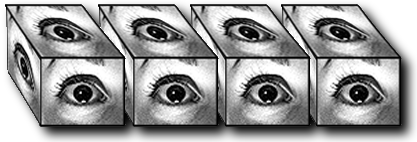
Well, now you have a clue to the answer. Beauty— or attractiveness— really is in the eye of the viewer. But there's even more to it than that. The experiment that you just took was a mini-version of a more extensive study that was recently conducted by several groups of psychologists around the globe. Photographs were first taken of hundreds of people of all races, colors and genders. Next, the photographs were enlarged or cropped to show the head and shoulders. A group of independent viewers was asked to separate and grade the facial characteristics based on both vertical and horizontal symmetry. This was established by actually tracing and measuring the distances from the corners and insides of each eye to the mid-line of the nose, the angle and shape of the lips and the size and shape of the nostrils. Other features that could verify the symmetry (or lack of it) in the photographs were also assessed. Once the photographs were graded for their symmetry, they were shown to another group of people of different ages, races, and genders. This time, however, the people were asked to make some of the same judgments about the people in the photographs— people that they had never met— that you were asked to make in our mini-experiment. The only difference was that their list of attributes was much longer. The people viewing the photographs were also given a wider scale (nine choices from -4 to +4) on which to rate each photograph. As you might have already guessed, the results were significantly more positive for photographs that were previously rated as being facially symmetrical. Women were more likely to make this assumption about symmetric faces than men. This difference was slight, but its significance will be discussed later. In an experiment conducted by Dr. Todd K. Shackelford and Dr. Randy J. Larsen at the University of Michigan ("Facial Asymmetry As An Indicator of Psychological, Emotional, And Physiological Distress, Journal of Personality and Social Psychology, 1997, Vol.72, No.2, p456-466), these experiments were replicated and taken one step further. The subjects, whose photographs were taken and shown to a random group for evaluation, were later subjected to a multitude of psychological and physical tests to evaluate whether or not they lived up to the observations made by total strangers. The results were astounding. Men, whose photographs were judged to be facial asymmetric (i.e. not bilateral and equal), were found to be more likely to have psychological problems such as depression, stomach problems, anxiety, headaches, sleep disturbances, difficulties with concentration and lower intelligence than those men whose photographs were judged to be facially symmetric! Women, whose photographs exhibited facial asymmetry, were also found to have poorer health, were less physically active, more prone to emotional instability, less happy and less intelligent than those whose images were facially symmetric. In all instances, standard tests such as the MMPI, BDI, EPQ, LOT and NPI were used. So, while beauty is in the "eye" of the beholder, our eyes would appear to be fairly reliable judges of both psychological and physical stamina. One reason for the stronger preferences for symmetry among women was postulated by this study. Since women assume the role in selecting one half of the genetic contribution to their offspring, they are likely to be selective for healthier and more emotionally stable mates. This ability to "size up" a man is something that has been perfected over generations and refined by natural selection.
"Facial Asymmetry (FA) increases as the presence of genetic disturbances such as deleterious recessives and with homozygosity. Also, FA increases with the exposure to environmental perturbations during development (i.e. extremes in temperature and pollution)." Note: The term homozygosity refers to the similarity of genetic characteristics that can cause a weakening of a species— such as occurrs with in-breeding. Heterozygosity, on the other hand, is the result of genetic variety which is able to change and adapt to environmental conditions. The latter is believed to be more beneficial to a species. Research suggests that we even choose our friends, mates, employees and role models based on their facial symmetry. It's one of the characteristics that the human race has acquired to assure that the healthiest, smartest and more dominant of our species will endure. But, like many human perceptions, this phenomenon may not always be accurate or fair. If there is some "hard wired" perception that causes discrimination against asymmetric faces, it should be expected that this discrimination would result in low self-esteem and depression. The significant measurements of psychological instability might not be attributed to the physiological asymmetry, but rather the result of unavoidable social rejection. Also, injuries to facial nerves from accidents— even excessive exposure to sunlight— can cause facial asymmetry. Having a symmetric face does not automatically imply superior traits. Humans have many different traits such as kindness, altruism, empathy, the ability to love, and spiritual potentials. These traits were not measured. Although these subtle traits may not have been essential for evolutionary success, they may prove to be vital as our species over-populates the Earth. The phyiscal perfection of Hitler's facially symmetric Nordic Race or the intellectual power of a bilateral Stalin are diminished in the crooked smile of just one Mother Theresa. If you enjoyed this article, you will also enjoy Left Brain: Right Brain in our archives.
|